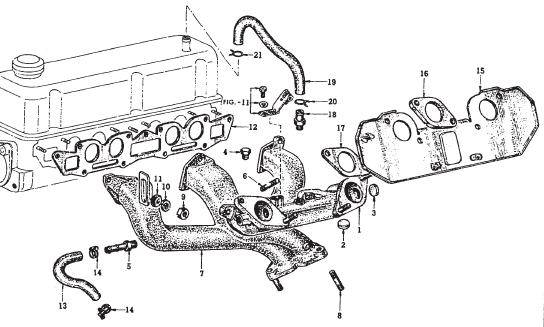| Revision as of 18:31, 23 July 2012 ddgonzal (Talk | contribs) <- Previous diff |
Current revision ddgonzal (Talk | contribs) (->GX Ventilation) |
||
| Line 1: | Line 1: | ||
| - | '''Positive Crankcase Ventilation (PCV)''' was the very first of the emission controls. It aims to prevent the crankcase from dumping fumes right into the atmosphere. This is a good system, and can actually help power and fuel economy. Before 1964, cars had a 'breather pipe' that led from the block down to the underside of the car. Normal blowby gases were thus simply vented to the air. Worse yet, when the piston rings became worn, a visible trail of smoke could be seen eminating from the bottom of the car. Not only did it pollute, but didn't smell good either. | + | '''Positive Crankcase Ventilation (PCV)''' was the very first of the emission controls (1964). It aims to prevent the crankcase from dumping fumes right into the atmosphere. This is a good system, and can actually help power and fuel economy. Before 1964, cars had a 'breather pipe' that led from the block down to the underside of the car. Normal blowby gases were thus simply vented to the air. Worse yet, when the piston rings became worn, a visible trail of smoke could be seen eminating from the bottom of the car. Not only did it pollute, but didn't smell good either. |
| = Overview = | = Overview = | ||
| - | [http://datsun1200.com/modules/myalbum/photo.php?lid=4847 http://datsun1200.com/modules/myalbum/photos/thumbs/4847.jpg] | ||
| - | <br> Black (lower) hose is the main PCV hose. On the manifold end it connects to the PCV valve. The other end goes to the engine block breather pipe. | ||
| - | |||
| - | Nissan calls its PVC system the "Crankcase Emission Control System". | ||
| - | |||
| The PCV system consists of three components: | The PCV system consists of three components: | ||
| # Simple vacuum-operated valve connected to the intake manifold | # Simple vacuum-operated valve connected to the intake manifold | ||
| # crankcase breather hoses: | # crankcase breather hoses: | ||
| - | #* from engine block to the air cleaner | + | #* from engine block to the PCV valve |
| - | #* from rocker cover to the air cleaner | + | #* from [[rocker cover]] to the [[Air Cleaner]] |
| - | Fumes are thus routed to either 1) air cleaner when engine speeds are high and so able to 'suck' the fumes in or 2) intake manifold when idling where vacuum is high and so opens the valve slightly and pulls the fumes out of the crankcase. This is where the efficiency comes in. Since at idle the pistons are operating under low vacuum, the PCV valve equalizes the forces in the crankcase, hence less oil is sucked into the cylinders at idle. | + | Upper breather hose connects to bottom side of air cleaner |
| + | <br>{{Photo|PCV_upper.jpg|sightings/forum}} {{Album|27052}} | ||
| - | [http://ddgonzal.members.winisp.net/wiki/Emissions/ET-22%20ET-37.JPG http://ddgonzal.members.winisp.net/wiki/Emissions/ET-22%20ET-37_th.JPG] | + | Lower breather hose |
| + | <br>{{Photo|PCV_lower.jpg|sightings/forum}} | ||
| - | Race cars are often required to use an oil/vapor seperator instead of, or in addition to, the PCV valve. The main purpose of this racing requirement is not to increase performance, but to control oil spills onto the race track surface. | + | The PCV Valve threads into the intake manifold |
| + | <br>{{Album|26135}} | ||
| + | |||
| + | Black (lower) hose is the main PCV hose. On the manifold end it connects to the PCV valve. The other end goes to the engine [[Breather Tubes|block breather pipe]]. | ||
| + | <br>{{Album|4847}} | ||
| + | |||
| + | H39 upper hose contains a "flame arrestor", so generic hoses should not be fabricated. A [http://google.com/search?q=11826-H3900 new hose is available] from Nissan. [[Emission_Control_Part_Numbers|11826-H3900]] was used starting July 1971. | ||
| + | <br>{{Album|13527}} | ||
| = CAUTIONS = | = CAUTIONS = | ||
| Line 23: | Line 27: | ||
| * oil-soaked or crusted with sludge (sometimes it can be cleaned with ether spray or carb cleaner). The valve inside should open and close when you shake it back and forth | * oil-soaked or crusted with sludge (sometimes it can be cleaned with ether spray or carb cleaner). The valve inside should open and close when you shake it back and forth | ||
| * Has a broken spring. The valve inside should close at rest, even if you hold it straight | * Has a broken spring. The valve inside should close at rest, even if you hold it straight | ||
| + | |||
| + | NOTE: A stuck PCV valve is a vacuum leak (if stuck open). It can cause a high idle or uneven idle. | ||
| + | |||
| + | = Operation = | ||
| + | Nissan calls its PVC system the "Crankcase Emission Control System", as it cleans up emissions with no loss of power. PCV system is a good thing. | ||
| + | |||
| + | Fumes are thus routed to either 1) air cleaner when engine speeds are high and so able to 'suck' the fumes in or 2) intake manifold when idling where vacuum is high and so opens the valve slightly and pulls the fumes out of the crankcase. This is where the efficiency comes in. Since at idle the pistons are operating under low vacuum, the PCV valve equalizes the forces in the crankcase, hence less oil is sucked into the cylinders at idle. | ||
| + | |||
| + | PCV system | ||
| + | <br>{{Photo|ET-22ET-37.jpg|Datsun%201200/wiki/Emissions}} | ||
| + | |||
| + | Datsun 1200 GX engines routed the hoses in a different manner. See [[A12GX_Engine#Block Ventilation|A12GX Engine]]. | ||
| + | |||
| + | Also see: | ||
| + | [[Engine_block#Ventilation]] | ||
| + | [[Breather Tubes]] | ||
| + | |||
| + | The 1982 [[Factory Service Manual]] says: <blockquote><hr>The positive crankcase ventilation (P.C.V.) valve is provided to conduct crankcase blow-by to the intake manifold. | ||
| + | |||
| + | During partial throttle operation of the engine, the intake manifold sucks the blow-by gas through the P.C.V. valve. | ||
| + | |||
| + | Normally, the capacity of the valve is sufficient to handle the blow-by and a small amount of ventilating air. | ||
| + | |||
| + | The ventilating air is then drawn from the carburetor air cleaner, through the hose connection carburetor air cleaner to rocker cover, into the crankcase. | ||
| + | |||
| + | Under full-throttle condition, the manifold vacuum is insufficient to to draw the blow-by flow through the valve, and its flow goes through the hose connection in the reverse direction. | ||
| + | |||
| + | On cars with an extremely high blow-by some of the flow will go through the hose connection to the carburetor air cleaner under all conditions.</blockquote> | ||
| + | |||
| + | = Non-stock Air Cleaner = | ||
| + | If you are not using a factory air cleaner, the upper ventilation hose can still be connected. | ||
| + | |||
| + | To retain the positive ventilation: | ||
| + | # Buy a hose adapter at your local auto parts store | ||
| + | # Drill a hole in the air cleaner, inside the filter area | ||
| + | # Attach the rocker cover hose to the air cleaner | ||
| + | |||
| + | Like this white angle adapter included in the Weber 32/36 kits | ||
| + | <br>{{Photo|dgav-s63mm.jpg|sightings/forum}} | ||
| + | |||
| + | Some convert to a non-positive fume system, by venting the rocker cover. If the PCV valve is left in place, this acts positively at idle and low engine speeds, but not at high speed. | ||
| + | <br>{{Album|10871}} | ||
| + | |||
| + | = Race Car = | ||
| + | Race cars are often required to use an oil/vapor separator instead of, or in addition to, the PCV valve. The main purpose of this racing requirement is not to increase performance, but to control oil spills onto the race track surface. Worn race engine may generate massive amounts of engine '''blowby''' and push oil out of the breather and into the environment. | ||
| + | |||
| + | See main article: [[Oil Catch Can]] | ||
| + | |||
| + | = GX Ventilation = | ||
| + | [[A12GX Engine]] breather hose routing is the opposite of a regular A12 engine. | ||
| + | |||
| + | A12 single: rocker cover to air cleaner | ||
| + | block breather tube to manifold | ||
| + | A12 twin: rocker cover to manifold | ||
| + | block breather tube air cleaner | ||
| + | |||
| + | The GX engine has a reverse flow block ventilation system, compared with the standard A12 engine. In the GX, the block breather hose goes to the air cleaner, while the rocker cover hose goes to the intake. | ||
| + | |||
| + | {{Album|8995}} {{Album|18250}} | ||
| + | |||
| + | Block "pipe connector" ([[Breather Tubes|breather tube]]) connects to the air cleaner | ||
| + | <br>{{Album|14541}} | ||
| + | |||
| + | = A10 Ventilation = | ||
| + | [[A10 Engine]] in the [[Datsun 1000]] did not have a [[PCV]] system. Instead, it relied on passive breathing — as did all cars before the positive system was developed. | ||
| + | |||
| + | A10 engine block breaths through the [[Oil_cap#Datsun_1000|oil filler cap]]. The cap is ventilated (not sealed like the A12 oil cap). | ||
| + | <br>{{Album|15099}} | ||
| + | |||
| + | This system did not draw the air out during idling, so over time the fumes got sludgy inside the engine. Even so it was not a big problem. At higher engine speeds, the airflow into the carburetor pulled air out of the block. | ||
| + | |||
| + | No [[Breather_Tubes#Style|breather tube]] — A10 from Datsun 1000 | ||
| + | <br>{{Album|17129}} | ||
| + | |||
| + | One improvement to be made is to connect the rocker cover via a hose to the air cleaner. In this way air is drawn up out of the engine. ([[J15]] engine pictured) | ||
| + | <br>{{Album|15633}} | ||
| + | |||
| + | Back of [[Rocker_cover#19102|rocker cover]] connected to [[Air_Cleaner|air cleaner]] | ||
| + | <br>{{Album|6547}} | ||
| = Interchange = | = Interchange = | ||
| - | Same as all Datsun (L/A/VG/U/R/CA/Z/E/J), many Nissan (including GA) and Subaru 1998-2002 2.5. | + | Same as all Datsun ([[L]]/A/VG/U/R/CA/Z/E/J), many Nissan (including [[GA]]) and Subaru 1998-2002 2.5. |
| == Part Numbers == | == Part Numbers == | ||
| - | * FRAM FV263 | + | 11810-A3500 ASSY-CONTROL VALVE CRANK CASE EMISSIO A12 |
| - | * Standard Motor Products V184T or V184 $2.19 | + | {{Thumb|26135}} |
| - | * Beck/Arnley 0450031 | + | |
| - | * Airtex 6P1056 or PCV2 $2.93 | + | |
| - | * AcDelco CV1016C or 25173530 | + | |
| - | * http://www.rockauto.com/catalog/x,carcode,1208483,parttype,5052 | + | |
| + | 1.64 in. height | ||
| + | 0.69 in. outlet | ||
| + | 0.75 in. O.D. | ||
| + | NPTF thread pitch | ||
| + | * Purolator PV1019 | ||
| + | ** Purolator PV1016 has same dimensions but flow differs | ||
| - | PCV Valve, from $4.00 - $7.50. Available everywhere | + | Aftermarket buy at [http://www.rockauto.com/catalog/x,carcode,1208483,parttype,5052 Rockauto.com] |
| + | * FRAM FV263 | ||
| + | * Standard Motor Products V184T or V184 $2.19 | ||
| + | * Beck/Arnley 0450031 | ||
| + | * Airtex 6P1056 or PCV2 $2.93 | ||
| + | * AcDelco CV1016C or 25173530 | ||
| - | * PCV Valve: FRAM FV263 $1.73, BECK/ARNLEY 0450031 $2.24 | + | PCV Valve, from $2.00 - $7.50. Available everywhere |
| - | <blockquote><hr> | + | <blockquote><hr> |
| - | Infiniti 1993 - 1997 J30 | + | PCV Valve: FRAM FV263 $1.73 |
| + | BECK/ARNLEY 0450031 $2.24 | ||
| + | |||
| + | Infiniti 1993-1997 J30 | ||
| Subaru 1998-2002 FORESTER 2002 IMPREZA | Subaru 1998-2002 FORESTER 2002 IMPREZA | ||
| - | 1971 - 1973 1200 | + | 1971-1973 1200 |
| - | 1972 - 1979 620 PICKUP | + | 1972-1979 620 PICKUP |
| - | 1966 - 1970 1600 | + | 1966-1970 1600 |
| - | 1974 - 1977 710 | + | 1974-1977 710 |
| - | 1968 - 1970 2000 | + | 1968-1970 2000 |
| - | 1980 720 PICKUP | + | 1980 720 PICKUP |
| - | 1977 - 1986 200SX | + | 1977-1986 200SX |
| - | 1983 - 1986 720 PICKUP | + | 1983-1986 720 PICKUP |
| - | 1979 - 1982 210 | + | 1979-1982 210 |
| - | 1977 - 1981 810 | + | 1977-1981 810 |
| - | 1970 - 1973 240Z | + | 1970-1973 240Z |
| - | 1974 - 1978 B210 | + | 1974-1978 B210 |
| - | 1975 - 1977 280Z | + | 1975-1977 280Z |
| - | 1986 - 1989 D21 PICKUP | + | 1986-1989 D21 PICKUP |
| - | 1979 280ZX | + | 1979 280ZX |
| - | 1976 - 1978 F10 | + | 1976-1978 F10 |
| - | 1990 - 1996 300ZX | + | 1990-1996 300ZX |
| - | 1982 - 1984 MAXIMA | + | 1982-1984 MAXIMA |
| - | 1979 - 1982 310 | + | 1979-1982 310 |
| - | 1987 - 1989 PATHFINDER | + | 1987-1989 PATHFINDER |
| - | 1967 411 , 1983 PULSAR | + | 1967 411 |
| - | 1968 - 1973 510 | + | 1983 PULSAR |
| - | 1983 - 1990 PULSAR NX | + | 1968-1973 510 |
| - | 1978 - 1981 510 | + | 1983-1990 PULSAR NX |
| - | 1982 - 1990 SENTRA | + | 1978-1981 510 |
| - | 1965 - 1968 520 PICKUP | + | 1982-1990 SENTRA |
| - | 1982 - 1986 STANZA | + | 1965-1968 520 PICKUP |
| - | 1969 - 1972 521 PICKUP | + | 1982-1986 STANZA |
| - | 1988 VAN | + | 1969-1972 521 PICKUP |
| - | 1973 - 1976 610 <hr></blockquote> | + | 1988 VAN |
| + | 1973-1976 610 | ||
| + | <hr></blockquote> | ||
| + | |||
| + | <blockquote><hr> | ||
| + | FRAM FV263 interchange | ||
| + | * Nissan | ||
| + | 11810-30P00/11810-40P00 | ||
| + | 11810-80W00 | ||
| + | 11810-A3500/11810-A3501 | ||
| + | 11810-E3000 | ||
| + | * AC-Delco CV941C | ||
| + | <hr></blockquote> | ||
| + | |||
| + | <blockquote><hr> | ||
| + | Nissan 11810-A3500 <2> 11810-A3501 | ||
| + | * 1983-1983 B11 with E15S/E16S engine | ||
| + | * 1979-1981 N10 with A14S/A15S engine | ||
| + | * 1983 N12 with E16S engine | ||
| + | |||
| + | Nissan 11810-A3501 | ||
| + | * 1982-1988 B11 with E15S/E16S | ||
| + | * 1988- B12 with GA16I | ||
| + | * 1986-1988 B12 with E16S/E16I | ||
| + | * 1989- KN13 with GA16 | ||
| + | * 1987-1988 KN13 with E16 | ||
| + | * 1988-1989 KN13 with CA18D | ||
| + | * 1987 KN13 with CA16D | ||
| + | * 1983- N12 with E16S | ||
| + | <hr></blockquote> | ||
| + | |||
| + | = Hose = | ||
| + | [[Emission Control Part Numbers]] | ||
| + | <br>{{Index|005-01.jpg|width=400}} | ||
| + | |||
| + | 11828-H1001 HOSE-PIPE CONNECTOR TO CONTROL VALVE | ||
| + | |||
| + | 11826-H1000 HOSE-ROCKER COVER TO AIR CLEANER | ||
| + | 11826-H1900 HOSE-ROCKER COVER TO AIR CLEANER 1070- <> 11826-H1000 | ||
| + | 11826-H3900 HOSE-ROCKER COVER TO AIR CLEANER 0771- <x> 11826-H1900 | ||
| + | * for use with ATC heated [[Air Cleaner]] | ||
| + | |||
| + | {{Photo|PCV_upper.jpg|sightings/forum}} | ||
| + | |||
| + | {{UploadPost|8710_56e620500cb63.jpg|477180}} | ||
| + | |||
| + | [[Category:Emission Control And Tune-Up]]{{End}} | ||
Current revision
Positive Crankcase Ventilation (PCV) was the very first of the emission controls (1964). It aims to prevent the crankcase from dumping fumes right into the atmosphere. This is a good system, and can actually help power and fuel economy. Before 1964, cars had a 'breather pipe' that led from the block down to the underside of the car. Normal blowby gases were thus simply vented to the air. Worse yet, when the piston rings became worn, a visible trail of smoke could be seen eminating from the bottom of the car. Not only did it pollute, but didn't smell good either.
Contents |
Overview
The PCV system consists of three components:
- Simple vacuum-operated valve connected to the intake manifold
- crankcase breather hoses:
- from engine block to the PCV valve
- from rocker cover to the Air Cleaner
Upper breather hose connects to bottom side of air cleaner

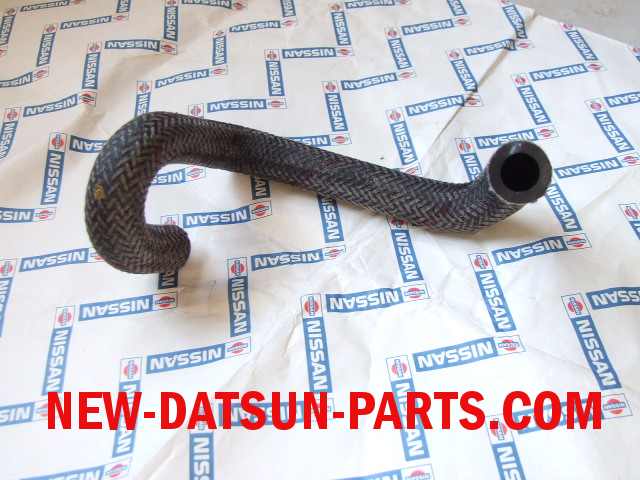
The PCV Valve threads into the intake manifold

Black (lower) hose is the main PCV hose. On the manifold end it connects to the PCV valve. The other end goes to the engine block breather pipe.

H39 upper hose contains a "flame arrestor", so generic hoses should not be fabricated. A new hose is available from Nissan. 11826-H3900 was used starting July 1971.

CAUTIONS
As part of your Tune-up, replace the PCV valve if it:
- oil-soaked or crusted with sludge (sometimes it can be cleaned with ether spray or carb cleaner). The valve inside should open and close when you shake it back and forth
- Has a broken spring. The valve inside should close at rest, even if you hold it straight
NOTE: A stuck PCV valve is a vacuum leak (if stuck open). It can cause a high idle or uneven idle.
Operation
Nissan calls its PVC system the "Crankcase Emission Control System", as it cleans up emissions with no loss of power. PCV system is a good thing.
Fumes are thus routed to either 1) air cleaner when engine speeds are high and so able to 'suck' the fumes in or 2) intake manifold when idling where vacuum is high and so opens the valve slightly and pulls the fumes out of the crankcase. This is where the efficiency comes in. Since at idle the pistons are operating under low vacuum, the PCV valve equalizes the forces in the crankcase, hence less oil is sucked into the cylinders at idle.
Datsun 1200 GX engines routed the hoses in a different manner. See A12GX Engine.
Also see: Engine_block#Ventilation Breather TubesThe 1982 Factory Service Manual says:
The positive crankcase ventilation (P.C.V.) valve is provided to conduct crankcase blow-by to the intake manifold.During partial throttle operation of the engine, the intake manifold sucks the blow-by gas through the P.C.V. valve.
Normally, the capacity of the valve is sufficient to handle the blow-by and a small amount of ventilating air.
The ventilating air is then drawn from the carburetor air cleaner, through the hose connection carburetor air cleaner to rocker cover, into the crankcase.
Under full-throttle condition, the manifold vacuum is insufficient to to draw the blow-by flow through the valve, and its flow goes through the hose connection in the reverse direction.
On cars with an extremely high blow-by some of the flow will go through the hose connection to the carburetor air cleaner under all conditions.
Non-stock Air Cleaner
If you are not using a factory air cleaner, the upper ventilation hose can still be connected.
To retain the positive ventilation:
- Buy a hose adapter at your local auto parts store
- Drill a hole in the air cleaner, inside the filter area
- Attach the rocker cover hose to the air cleaner
Like this white angle adapter included in the Weber 32/36 kits

Some convert to a non-positive fume system, by venting the rocker cover. If the PCV valve is left in place, this acts positively at idle and low engine speeds, but not at high speed.
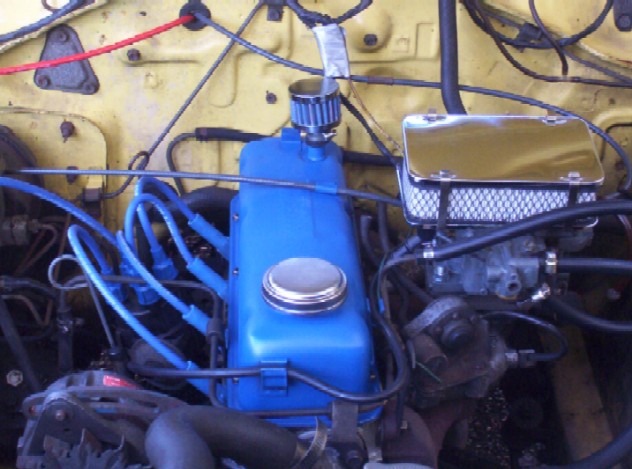
Race Car
Race cars are often required to use an oil/vapor separator instead of, or in addition to, the PCV valve. The main purpose of this racing requirement is not to increase performance, but to control oil spills onto the race track surface. Worn race engine may generate massive amounts of engine blowby and push oil out of the breather and into the environment.
See main article: Oil Catch Can
GX Ventilation
A12GX Engine breather hose routing is the opposite of a regular A12 engine.
A12 single: rocker cover to air cleaner
block breather tube to manifold
A12 twin: rocker cover to manifold
block breather tube air cleaner
The GX engine has a reverse flow block ventilation system, compared with the standard A12 engine. In the GX, the block breather hose goes to the air cleaner, while the rocker cover hose goes to the intake.
Block "pipe connector" (breather tube) connects to the air cleaner

A10 Ventilation
A10 Engine in the Datsun 1000 did not have a PCV system. Instead, it relied on passive breathing — as did all cars before the positive system was developed.
A10 engine block breaths through the oil filler cap. The cap is ventilated (not sealed like the A12 oil cap).
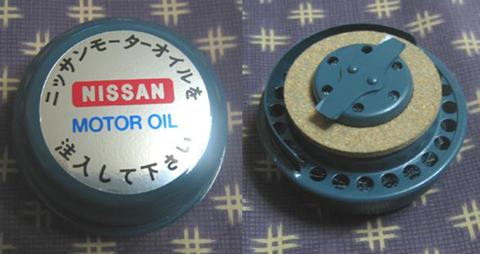
This system did not draw the air out during idling, so over time the fumes got sludgy inside the engine. Even so it was not a big problem. At higher engine speeds, the airflow into the carburetor pulled air out of the block.
No breather tube — A10 from Datsun 1000

One improvement to be made is to connect the rocker cover via a hose to the air cleaner. In this way air is drawn up out of the engine. (J15 engine pictured)

Back of rocker cover connected to air cleaner
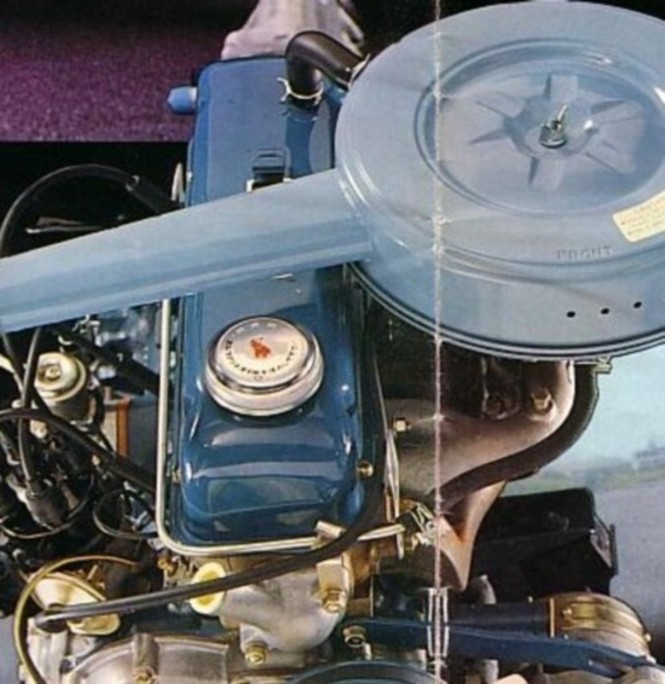
Interchange
Same as all Datsun (L/A/VG/U/R/CA/Z/E/J), many Nissan (including GA) and Subaru 1998-2002 2.5.
Part Numbers
11810-A3500 ASSY-CONTROL VALVE CRANK CASE EMISSIO A12

1.64 in. height 0.69 in. outlet 0.75 in. O.D. NPTF thread pitch * Purolator PV1019 ** Purolator PV1016 has same dimensions but flow differs
Aftermarket buy at Rockauto.com * FRAM FV263 * Standard Motor Products V184T or V184 $2.19 * Beck/Arnley 0450031 * Airtex 6P1056 or PCV2 $2.93 * AcDelco CV1016C or 25173530
PCV Valve, from $2.00 - $7.50. Available everywhere
PCV Valve: FRAM FV263 $1.73 BECK/ARNLEY 0450031 $2.24Infiniti 1993-1997 J30 Subaru 1998-2002 FORESTER 2002 IMPREZA 1971-1973 1200 1972-1979 620 PICKUP 1966-1970 1600 1974-1977 710 1968-1970 2000 1980 720 PICKUP 1977-1986 200SX 1983-1986 720 PICKUP 1979-1982 210 1977-1981 810 1970-1973 240Z 1974-1978 B210 1975-1977 280Z 1986-1989 D21 PICKUP 1979 280ZX 1976-1978 F10 1990-1996 300ZX 1982-1984 MAXIMA 1979-1982 310 1987-1989 PATHFINDER 1967 411 1983 PULSAR 1968-1973 510 1983-1990 PULSAR NX 1978-1981 510 1982-1990 SENTRA 1965-1968 520 PICKUP 1982-1986 STANZA 1969-1972 521 PICKUP 1988 VAN 1973-1976 610
FRAM FV263 interchange * Nissan 11810-30P00/11810-40P00 11810-80W00 11810-A3500/11810-A3501 11810-E3000 * AC-Delco CV941C
Nissan 11810-A3500 <2> 11810-A3501 * 1983-1983 B11 with E15S/E16S engine * 1979-1981 N10 with A14S/A15S engine * 1983 N12 with E16S engineNissan 11810-A3501 * 1982-1988 B11 with E15S/E16S * 1988- B12 with GA16I * 1986-1988 B12 with E16S/E16I * 1989- KN13 with GA16 * 1987-1988 KN13 with E16 * 1988-1989 KN13 with CA18D * 1987 KN13 with CA16D * 1983- N12 with E16S
Hose
11828-H1001 HOSE-PIPE CONNECTOR TO CONTROL VALVE
11826-H1000 HOSE-ROCKER COVER TO AIR CLEANER 11826-H1900 HOSE-ROCKER COVER TO AIR CLEANER 1070- <> 11826-H1000 11826-H3900 HOSE-ROCKER COVER TO AIR CLEANER 0771- <x> 11826-H1900 * for use with ATC heated Air Cleaner

![[Datsun 1200 encyclopedia]](/wiki/upload/wiki.png)


